Russian postcard by Izdanije Byuro Propogandy Sovietskogo Kinoiskusstva, no. 4176, 1963. Retail price: 8 Kop.
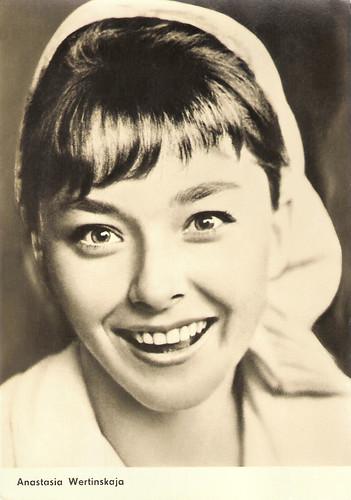
East-German postcard by VEB Progress, Berlin, no. 2.207. Retail price: 0,20 DM. Photo: Schwarz.
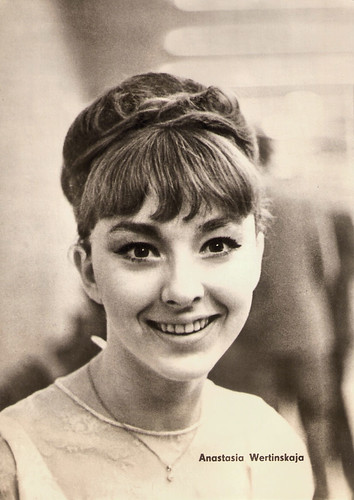
East-German postcard by VEB Progress, Berlin, no. 3187. Retail price: 0,20 DM. Photo: Balinski.
Emotional Trauma
Anastasiya Alexandrovna Vertinskaya (Russian: Анастасия Александровна Вертинская) was born in Moscow, Soviet Union (now Russia), in 1944.
Her father, Aleksandr Vertinsky, was a famous Russian actor, singer and songwriter, who returned from his emigration in China to Moscow during the Second World War. Her mother, Lidiya Vertinskaya (née Lidia Vladimirovna Tsirgvava), was also a Russian émigré who was born into a Georgian-Russian family in Kharbin.
Young Anastasiya (or Anastasia) and her sister Marianna, who would become an actress too, were brought up in a multi-lingual family where they enjoyed an intellectually stimulating environment, and the highly cultural atmosphere of their parents circle.
Anastasia Vertinskaya was fond of her father, who invested much of his talent and energy in his daughter's education. Her famous father died when she was 14.
She suffered from an emotional trauma that casted an influence on her most important film roles, which she played at the age of 15 to 19.
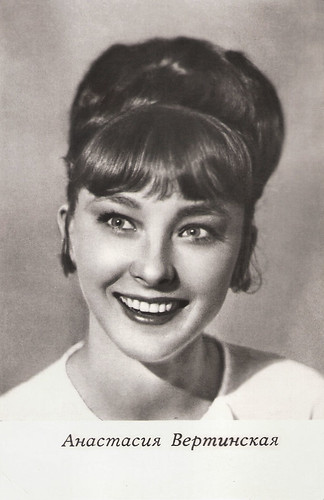
Russian postcard, no. 4176, 1967. This postcard was printed in an edition of 100.000 cards.
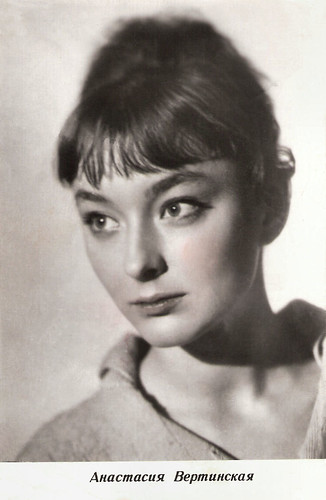
Russian postcard by Izdanije Byuro Propogandy Sovietskogo Kinoiskusstva, no. A 07454. Photo: Photostudio Dinamo. This postcard was printed in an edition of 10.000 cards. The price was 8 kop.
Russian postcard by Izdanije Byuro Propogandy Sovietskogo Kinoiskusstva, no. M 17432 31, 1967. Photo: G. Vajlja. This postcard was printed in an edition of 150.000 cards. Retail price: 8 Kop.
Instant Celebrity
As a schoolgirl of 15, Anastasiya Vertinskaya made her film debut starring in Alye parusa/Scarlet Sails (Aleksandr Ptushko, 1961). The film is based on Alexander Grin (or: Green)'s 1923 adventure novel of the same name.
She portrayed love-torn village girl Assol. As a child, she encounters an old man who claims to be a wizard and promises the girl that one day a prince will come on a ship with scarlet sails to carry her away. The villagers scoff but Assol believes her dream will come true one day, and yes....
This film made her an instant celebrity in the Soviet Union. Alongside Vertinskaya, the film employed many of the present and future stars of the Soviet cinema, including Vasily Lanovoy, Ivan Pereverzev, Sergey Martinson, and Oleg Anofriev.
The next year she co-starred as Guttieres, a young woman in love with an amphibian man in Chelovek-Amfibiya/The Amphibian Man (Gennadi Kazansky, Vladimir Chebotaryov, 1962). The successful film was based on the Alexander Belyayev's book of the same name.
In the same year the actress joined the troupe of the Pushkin Theatre in Moscow. This meant that from then on she had to continuously tour the country with the then popular so-called ‘theatre brigades’.
Vertinskaya shot to international fame starring in another dramatic role as Ophelia opposite Innokenti Smoktunovsky in Gamlet/Hamlet (1964) - a well-known adaptation of the Shakespearean play, directed by Grigori Kozintsev.
Russian postcard by Izdanije Byuro Propogandy Sovietskogo Kinoiskusstva, no. A 11231, 1966. Photo: G. Vajlja. This postcard was printed in an edition of 100.000 cards. The price was 8 kop.
Russian postcard by Izdanije Byuro Propogandy Sovietskogo Kinoiskusstva, nr. A 10674, 1967. This postcard was printed in an edition of 200.000 cards. Retail price: 8 Kop.
Russian postcard by Izdanije Byuro Propogandy Sovietskogo Kinoiskusstva, nr. M 27929, 1968. This postcard was printed in an edition of 185.000 cards. Retail price: 8 kop.
People's Artist of the RSFSR
Anastasiya Vertinskaya attended the Mikhail Shchepkin Higher Theatre College. Among her fellow students was Nikita Mikhalkov: they fell in love and married in 1966, only to be divorced three years later.
She graduated in 1967 and a year later she began to work at the Sovremennik Theatre in Moscow. From 1980, she was engaged at the Moscow Art Theatre. Her most acclaimed stage appearances were in plays by Anton Chekhov, as Nina in The Seagull and as Elena in Uncle Vanya.
In a theatrical experiment by director Anatoli Efros at Taganka, she appeared in two roles: as Prospero and Ariel in William Shakespeare's The Tempest. In 1989 she portrayed her father, Aleksandr Vertinsky, in a show that she also wrote and directed to mark the centennial birthday anniversary of her father.
While still in the Shchepkin College, Vertinskaya got a role of petite Princess Lisa Bolkonsky in the epic adaptation of Leo Tolstoy’s Voyna i mir/War and Peace (Sergei Bondarchuk, 1967). According to Wikipedia, it was her highly sensual, touchingly naïve portrayal that added this character a new, humane dimension.
In the cinema she also played supporting roles as Kitty in Anna Karenina (Aleksandr Zarkhi, 1967), and as one of the lovers in Vlyublyonnye/Tenderness (Elyer Ishmukhamedov, 1969).
Other notable films were Ne goryuy/Don't Grieve (Georgi Daneliya, 1969), Sluchay s Polyninym/The Polunin Case (Aleksei Sakharov, 1970), Ten/Shadow (Nadezhda Kosheverova, 1971) based on a story by Hans Christian Andersen, Bezymyannaya zvezda/An Unnamed Star (Mikhail Kozakov, 1978), and the Mark Twain adaptation Novye priklyucheniya yanki pri dvore korolya Artura/New Adventures of a Yankee in the Court of King Arthur (Viktor Gres, 1988).
Outside of her film career she taught acting in Oxford and in the European film school in Switzerland; she also held a master class at the Comédie-Française (Théâtre de la Républic) and at the Chekhov's school in Paris.
She was designated People's Artist of the Russian Soviet Federative Socialist Republic (RSFSR) in 1978. She is also a recipient of the Order of Honour (2005) and the Order of Friendship (2010) of the Russian Federation.
Since 1991 Anastasiya Vertinskaya has been running the Charitable Foundation for Actors, which supports such cultural landmarks as the home of Boris Pasternak and the museum of Anton Chekhov as well as many other cultural projects and individual actors and filmmakers.
During the 1990s, she completed restoration of her father's historic recordings for a CD release. Her most recent films are Zazda strasti/Thirst of passion (Andrey Kharitonov, 1991), Master i Margarita/Master and Margareth (Yuri Kara, 1994), and Bremenskie muzykanty/The Bremen Town Musicians (Aleksandr Abdulov, 2001), based on the fairy tale by the brothers Grimm.
Anastasiya Vertinskaya was married to film director and actor Nikita Mikhalkov. Their son, Stepan Mikhalkov (1967), is also a filmmaker. She also has a daughter, Manana (1969), with actor Mikhail Kozakov.
Anastasiya Vertinskaya lives and works in Moscow. In 2010 Vertinskaya published a book of poetry she'd been working on for five years. She's also involved in her son Stepan Mikhalkov's restaurant business in Moscow, her passion for culinary art being well known.
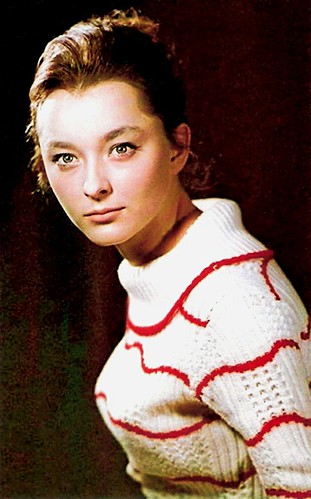
Russian postcard by Izdanije Byuro Propogandy Sovietskogo Kinoiskusstva.
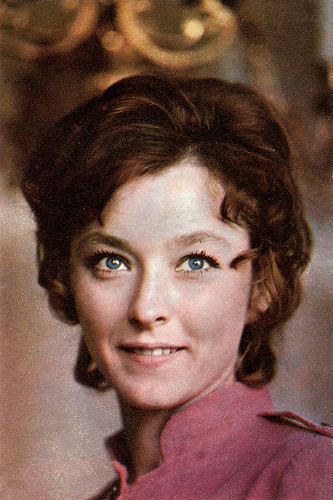
Russian postcard by Izdanije Byuro Propogandy Sovietskogo Kinoiskusstva, no 1574, 1972. This postcard was printed in an edition of 200.000 cards. Retail price: 5 Kop.
Sources: Steve Shelokhonov (IMDb), Peoples.ru (Russian), Wikipedia, and IMDb.
Mikhail Kozakov was not a rock star but an actor/director, he's never been married to Vertinskaya and although he's had a daughter named Manana, she has nothing to do with Vertinskaya either. Similarly, Gradsky was a long-term boyfriend, never a husband. Vertinskaya was married once: Nikita Mikhalkov is her only ex-husband and she has 1 son, Stepan.
ReplyDeleteThanks for your comment. We've changed the information.
ReplyDeleteGreat post. I was not familiar with her at all so it was great to learn about her. This site is such a wealth of info.
ReplyDelete